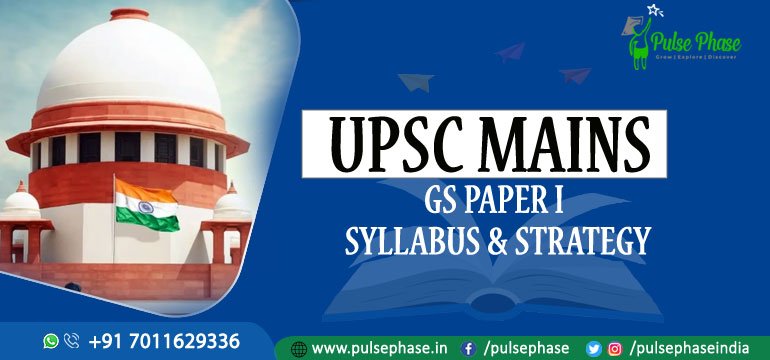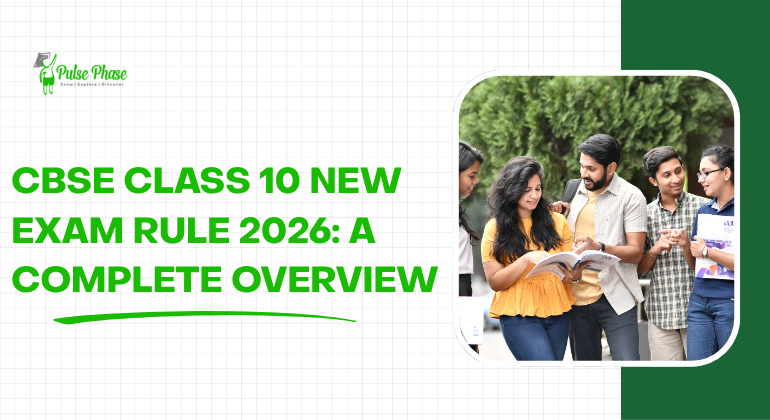UPSC Mains GS 1 Syllabus & Strategy
General Studies-I. General Studies (GS) Paper 1 is often the first exam encountered in competitive examinations like the UPSC Civil Services Exam (CSE). It tests a broad range of subjects, aiming to assess a candidate’s foundational knowledge and understanding of the world around them.it is a subjective type of paper consisting of the following subjects (Indian Heritage and Culture, History and Geography of the World and Society). it includes 10 questions for 10 marks in 150 words and 10 questions for 15 marks in 250 words.
Table of Content
- Indian Society
- World History
- Geography
- Indian Heritage and Culture
- Post-Independence Consolidation
- Modern History
- Standard Books to Prepare for GS Paper-1
- UPSC GS Paper Preparation Tips
- FAQs related to GS Paper 1
INDIAN SOCIETY
UPSC Mains GS 1 Syllabus defined by UPSC:
Salient features of Indian Society, Diversity of India. Role of women and women’s organisations, population and associated issues, poverty and developmental issues, urbanisation, and their problems and their remedies, Effects of globalisation on Indian society, Social empowerment, communalism, regionalism & secularism.
UPSC Mains GS 1 Syllabus – Sub Topics for Indian Society:
Topic 1. Salient features of Indian society
- What is Indian society?
- Is it a mental construct or a living reality?
- Features of Indian society
- Changes within Indian society and their repercussions
- Causes of changes
- Coping mechanisms derived
- Indian society today
2. Diversity of India
- What is diversity?
- Types of diversities in India
- Can diversity be equated with difference?
- The unity in diversity- a reality or a delusion
- Some examples
- Manner of reconciliation
3. Role of women’s organisations
- What are Women’s organisations?
- Women’s organisations in Indian history
- Types of women’s organisations
- Level of penetration
- Women’s organisation – a ray of hope, few case studies
- Should women’s organisation be female centrist or a positive change in the structure is the need of the hour- an appraisal?
- Problems faced by women’s organisations
- Is a larger vocal role possible and ways to achieve the same?
4. Poverty and development issues
- Poverty – Definition and concept
- Concept of development
- Development and poverty – the matrix
- Sen vs Bhagwati model
- Crisis of development
- Certain case studies
- Is filling the chasm possible- and how so
- Government’s initiatives and the five year plans
- Role of civil society organisations
- An assessment
5. Population and associated issues
- What is population- meaning and concept
- Different components of population
- Problem of IMR, MMR and TFR
- International Targets (MDGs) and India’s story
- The government’s initiatives for the same
- Family planning and the problems
- Demographic dividend and the way to capitalise it
6. Urbanisation, their problems and remedies
- Urbanisation introduction through Census 2011
- Urbanisation and issues
- Transport
- Waste disposal
- Rural-urban migration
- Sanitation
- Environment
- Housing
- Water depletion
- Pollution
- Steps taken by GOI
- Issues and reforms needed
7. Effects of globalisation on Indian society
- What is the meaning of globalisation?
- Meaning of Indian society
- Kinds of the impact of globalisation – economic, political, developmental, and socio-cultural
- Is the impact solely positive or negative an assessment?
8. Social empowerment
- Meaning and concept of social empowerment
- Why do we need social empowerment?
- Specific sections for whom social empowerment is the lifeblood
- Social empowerment through the five-year plans
- Government’s initiatives for empowerment
- Empowerment in reality and India’s experience
- Other approaches /players/tools for social empowerment and some case studies on the same
9. Communalism
- Meaning and concept of communalism
- Historicity of communalism
- Is it an ideology or just some random events a re look?
- Recent incidents
- Role of third parties in inciting/perpetrating communalism
- Communalism under the law
- Can communalism be eradicated from the Indian society completely?
- Way forward
10. Secularism
- Meaning and concept of secularism
- Secularism through the vantage point of the Indian Constitution
- Comparisons of models
- Gandhi Ji on religion
- Indian philosophy on secularism
- Threats on the Secular Spirit
- Is the Indian democracy mature enough to handle the gravity of secularism in the light of the Lok-Sabha election results in 2024?
- Do we need to work on the Indian brand of secularism and how is that going to be possible?
11. Regionalism
- Meaning and concept of regionalism
- Why regionalism?
- Theories on regionalism
- Regionalism in its various manifestations
- Role of various players
- Recent incidents causing a wave of flurry
- Possible ways to tackle the same
WORLD HISTORY –
UPSC Mains GS 1 Syllabus Defined by UPSC:
History of the world will include events from 18th century such as industrial revolution, world wars, redraw of national boundaries, colonisation, decolonisation, political philosophies like communism, capitalism, socialism etc.- their forms and effect on the society.
UPSC Mains GS 1 Syllabus -Sub Topics for World History:
1. Industrial Revolution
- Decline of feudalism
- Beginning of Renaissance
- Pre-industrial Europe
- Agricultural Revolution
- Factors that led to industrial revolution
- Impact of industrial revolution
2. French Revolution
- Causes
- The revolution in France
- France under Napoleon
- Impact of Revolution
- Significance of Revolution
3. Nationalism in Europe
- Rise of the nation- state system
- Unification of Italy
- Unification of Germany
4. Colonialism and Imperialism
- Colonialism
- The age of Imperialism (1870-1914)
- Imperialism in Asia
- Analysis of Colonialism
5. Emergence of USA
- Foundation of American Colonies
- The Independence of United States of America
- The American Revolutionary War
- What was the impact of American Revolution?
- Political Effects of the Revolution
- How did the American Revolution influence the French Revolution?
- US Civil War
- Impact of Civil War on USA
- Global Impact of US Civil War
- Impact on India
6. World War-I
- Major causes of the war
- Course of the war
- Analysis of major events of the war
- Consequences of World War I
- Aftermath of World War I
- League of Nations
7. Russian Revolution
- Major events in pre-revolution Russia
- Causes
- Course of Revolution
- Consequences
- Aftermath of the war
- Post-Lenin Russia
8. Inter-War Years (1919 To 1939)
- The Great Depression
- The Great Depression- an economic perspective
- Rise of Fascism in Italy
- Rise of Nazism in Germany
- Soviet Union (USSR)
9. World War- II
- Foundations of the war
- Course of the war
- Aftermath of war
- Analysis of the war
- Decolonization phase
10. Development in Middle East
- Democratic reforms in Middle East
- Arab nationalism
- Israel & Palestine Issue
11. Cold War
- Political philosophies
- Capitalism
- Socialism
- Communism
12. World After Cold-War
- Global issues since 1991
- Integration of Europe
- European integration- a timeline
- Rise of global Islamic terrorism
- Rise of China
GEOGRAPHY-
UPSC Mains GS 1 Syllabus defined by UPSC:
Salient features of world’s physical geography, Distribution of key natural resources across the world (including South Asia and the Indian sub-continent); factors responsible for the location of primary, secondary, and tertiary sector industries in various parts of the world (including India), Important Geophysical phenomena such as earthquakes, Tsunami, Volcanic activity, cyclone etc., geographical features and their location- changes in critical geographical features (including water-bodies and ice-caps) and in flora and fauna and the effects of such changes.
UPSC Mains GS 1 Syllabus – Sub Topics for Geography:
1. Salient features of world’s physical geography
- Geo-morphology
- Meaning & Scope of Geo-morphology
- Internal Structure of Earth
- The Theory of Continental Drift
- Plate Tectonics theory
- Rocks
- Classification of Forces affecting the land-forms
- Mountain Building
- Earthquakes & Tsunamis
- Volcanism
- Plains and Plateau
- Oceanography
- Ocean Bottom Relief
- Temperature and Salinity of Ocean Waters
- Ocean Currents
- Tides
- Coral Reefs
- Geopolitical importance of Indian Ocean
- Climatology
- Earth’s Atmosphere
- Weather and Climate
- Air Mass, Fronts & Cyclones
- Climatic division of India
2. Distribution of key natural resources across the world (including South Asia and the Indian sub-continent)
- Distribution of soil
- Distribution of minerals
- Distribution of rivers
- Distribution of crops
3. Factors responsible for the location of primary, secondary, and tertiary sector industries in various parts of the world (including India)
- Introduction
- Primary sector and locations
- Secondary sector and locations
- Tertiary sector and locations
- Issues in industrial development
- GOI steps
- Recommendations
4. Important Geophysical phenomena
- Earthquakes
- Tsunami
- Volcanic activity
- European integration- a timeline
- Rise of global Islamic terrorism
- Rise of China
5. Geographical features and their location
- Mountains
- Plains
- Plateaus
- Other features
- Degradation due to human activities
6. Changes in critical geographical features
- Human impact on geographical features as climate change, ocean acidification, water depletion, pollution, deforestation, desertification, erosion.
INDIAN HERITAGE & CULTURE-
UPSC Mains GS 1 Syllabus defined by UPSC:
Indian Heritage culture will cover the salient aspects of Art Forms, Literature and Architecture from ancient to modern times.
UPSC Mains GS 1 Syllabus-Sub Topics for Indian Heritage & Culture:
- Palaeolithic art
- Art & culture during Indus Valley civilisation
- Religion and Indian philosophy
- Architecture and sculpture Since Mauryan age
- Indian paintings
- Classical forms of dance
- Folk dance forms
- Classical music
- Musical instruments
- Drama/theatre
- Puppet forms of India
- Indian pottery
- Indian literature
- Government institutions related to art and culture
- Culture and social change
POST-INDEPENDENCE CONSOLIDATION
UPSC Mains GS 1 Syllabus-Syllabus defined by UPSC:
Post-independence consolidation and reorganisation within the country.
UPSC Mains GS 1 Syllabus-Sub Topics for Post-Independence Consolidation:
1. Reorganisation of states
- Status on the eve of independence
- Factors that lead to merger
- Accession of the princely states
- Accession of States under France and Portuguese
- Accession of Sikkim
- Rehabilitation of the Refugees
- Federal crisis
- State reorganisation
- Need for Second State Reorganisation
- Formation of Telangana
- Issue of Linguistic Regionalism
2. Issue related to vulnerable section
- Tribal Issue
- Caste and Communalism Women’s empowerment
- Issue of linguistic minorities
3. Overview of economic development since
- independence
- Planning in India
- Agriculture development
- Manufacturing sector
- Service sector
- New economic policy and its impact
MODERN HISTORY-Syllabus defined by UPSC:
Modern Indian history from about the middle of the eighteenth century until the present- significant events, personalities, issues. The Freedom Struggle – its various stages and important contributors/contributions from different parts of the country.
Sub Topics for Modern History:
1. British Conquest of India
- Decline of the Mughal Empire
- Rise of regional politics
- India in the Eighteenth Century
- Advent of Europeans
- Factors that led to the conquest of India by the British
- Conquest of regional powers
- Resistance of Indian powers and causes of failure
- Evolution of British paramountcy over princely states
2. British Administration
- British Colonialism in India
- British policies in India
- British Economic Policies and their impact
- Rise of the capitalist class
- Activities of Christian Missionaries
- Governors- Generals and administration till 1857
- Colonial administration till 1857
3. Early Resistance to British Rule
- Tribal revolts
- Various tribal movements in India
- Civil rebellions and peasant revolts
- Nature and significance of civil rebellions
- Various peasant movements in India
- The revolt of 1857 and the personalities associated
4. Nationalism in India
- Rise of nationalism in India
- Social Basis of Indian Nationalism
- Rise and growth of the Indian National Congress
- Policies and programs of early nationalists
- Role of literature and News media in freedom struggle
- Intensification of the nationalist movement
- Home Rule League
- Militants and Revolutionaries
- Gadar movement
5. Indian Freedom Struggle Under Gandhi
- Gandhi in South Africa
- Non- cooperation Movement
- Civil Disobedience Movement
- Round Table Conference
- Poona Pact
- 1939 Tripuri Session
- August Offer
- Individual Satyagraha 1940-41
- Quit India Movement
- British Official response to national movement
6. Social Reforms in British India
- Regeneration, reform and renaissance in India
- Social reformers in India
- Reforms in western India
- Reforms in South India
- Role of reformers
- Nature and limitation of 19th-century renaissance
- Reasons of rise
- Caste movement in south India
- Caste movements in northern and eastern India
7. Struggle by the Masses
- Trade union movement in India
- Peasant movements in modern India
- The states people’s movements
- Socialists and left bloc in congress
- Indian National Army
- Naval mutiny of 1946
8. Partition of India
- Rise and growth of communalism
- Partition of India and attainment of freedom
- Wavell Plan
- Cabinet Mission Plan
- Mountbatten Plan
Standard Books Recommended by PulsePhse.in
- History of Medieval India by Satish Chandra
- India After Independence by Bipan Chandra
- India’s Struggle for Independence by Bipan Chandra
- Indian Heritage and Culture-Dr. PK Agrawal (NCERT)
- World Geography by DR Khullar
- Oxford Atlas for Geography
- Geography NCERTs (Class VI and XII) Old / New (old book has better content)
- Geography of India by Majid Hussain
- Ancient India by RS Sharma
- Central Physical and Human Geography by GC Leong
- From Plassey To Partition and After by Sekhar Bandyopadhyay
Conquering UPSC GS Paper 1: Top 10 Preparation Tips by IAS Toppers
UPSC Civil Services Exam (CSE) requires a strategic approach & dedication to crack general studies paper-1. Below are the top 10 tips to excel your IAS Exam preparation.
1. Understand the GS Syllabus:
- Before diving in, thoroughly grasp the official syllabus provided by UPSC.
- Identify the weightage for each section and prioritise accordingly.
2. Build a Strong Foundation:
- Read NCERT textbooks (Class 6-12) for History, Geography to form a solid base.
- Focus on understanding core concepts rather than rote memorisation.
3. Standard Reference IAS Study Materials:
- Supplement NCERTs with standard reference books recommended by toppers or coaching institutes.
- These provide in-depth analysis and cover advanced topics.
4. Master the Art of Note-Making:
- Develop a note-taking method that works for you.
- Include key points, diagrams, and important data for efficient revision.
5. Current Affairs are Key:
- Stay updated on national and international news through reliable sources like newspapers, news websites, and government publications.
- Link current events to relevant sections of the syllabus for comprehensive understanding.
6. Practice Answer Writing:
- Regularly practice writing answers in the UPSC format.
- Focus on clarity, structure, content, and answer presentation.
- Mock test series can provide valuable feedback and timed practice.
7. Previous Year Question Papers:
- Analyzing past UPSC question papers is crucial.
- Identify recurring themes, question formats, and the level of expected analysis.
- Practice answering these papers under exam conditions.
8. Discussion and Debate:
- Discuss topics with fellow aspirants or join study groups.
- Sharing perspectives and engaging in healthy debate clarifies concepts and strengthens your analytical skills.
9. Time Management is Essential:
- Create a realistic study schedule that allocates sufficient time for each section.
- Factor in revision and breaks to avoid burnout.
10. Stay Motivated:
- The UPSC journey can be long.
- Surround yourself with positive influences and maintain a healthy balance between studies and personal well-being.
Remember, consistent effort, the right approach, and the use of these tips will equip you to tackle GS Paper 1 effectively and move closer to your UPSC dream. Wish You All the best -Pulse phase Team.
FAQs About GS Paper 1 Syllabus
Q 1. What are the topics covered in GS Paper 1?
Answer: Topics covered in UPSC GS paper-1 are as follows Indian Heritage and Culture, History, Geography, Indian Society, General Issues on Environmental Ecology, Biodiversity and Climate Change and Current events of national and international importance.
Q 2. What is the best way to prepare for GS Paper 1?
Answer: You can Focus on analytical thinking and developing the ability to form well-informed opinions on various issues, Practice map skills, especially for the geography section, pay attention to developing a strong vocabulary and clear writing style, regularly review your progress and identify areas that need improvement.
Q 3. Which reference books should I use for GS Paper 1?
Answer: Reference books are mentioned above. Please check Books to Read for GS Paper Preparation in our recommendation section.
Q 4. Where can I find the previous year’s question papers for GS Paper 1?
Answer: Download UPSC’s previous Questions paper from our Study Material Section.
Q 5. What are some common mistakes to avoid in GS Paper 1?
Answer: Attempt all the questions of paper and give answers in point format not give time more than 7-8 minutes.




